Beth Kephart's Blog, page 175
July 16, 2012
genuine happiness is genuine gold
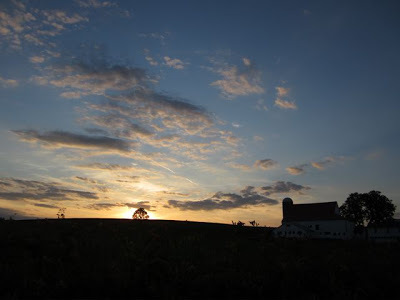
I have mentioned her previously here—ageless, gorgeous, a knock-out, smart, funny, perpetually a Kindle in her hand (she not only reads great books, she once owned a bookstore). We dance Zumba together, when I'm very lucky. She shows up all blonde and coiffed, I show up all frizzy haired and old eyelinered, and we do it up. She goes crazy for the Charleston. I'll give her that if she'll dance my tango.
Her name is Joy, and I flat out love her. I refuse to believe the things she tells me about how old she is. Not even close. Not for a minute.
Today I barely got to Zumba on time. I didn't think, in fact, that I'd make it, but I finished a client call with seconds to spare and made a mad dash for the gym. Looking back, imagining myself a no-shower for Zumba, imagining that client call gone just five minutes longer, I feel bereft. For I would never have seen Joy in her joyful frenzy, plastering Xeroxes of The New York Times review of Small Damages all over the club town. When she saw me she ran for a hug, Xeroxes in hand, then orchestrated a round of applause among the gathered dancers, then went about telling all the ladies I Zumba with that I'm an author in disguise.
I watched her with awe. I listened to what she said. I caught a glimpse of the mess of me in the mirror and tried to reconcile my image of myself with the beauty of her. Not possible. She rushed by as the music was getting started and said,
"I'm as proud as if I were your own mother."
Genuine happiness is genuine gold.




Published on July 16, 2012 15:09
what do you know about time?

Back in mid-April, at Beach Haven, when sweaters were de rigueur and wet hair dried in chilly crisps, when I rose early to meet the dolphins, when I tried to get away but work kept finding me anyway—back then, there was this woman by the sea. A retired school teacher, she told me. Never married. The kind of person who only ever reserved rooms in hotels where dogs are welcome and where you can bring a little pan of some pre-concocted stew and heat it. She was an off-season Beach Haven regular. She liked to sit in an old beach chair, its plastic weave gone slightly awry, with a fishing rod poked into the sand.
She liked, she said, to sit all day.
And from what I could tell, she did.
I liked how comfortable she was alone. How unafraid of time just passing. How dutiful she was in her self-commissioned role of watching the sky and sea change. I wondered if I could sit like that, if only for a day, and if, at the end of the day, I would better understand time, know more than most about what it is to measure out the hours.
I think of her now, when all I really want is to sit and read and (every now and then) look up and study a bird or listen to the chorus of the angry hot cicadas.




Published on July 16, 2012 06:34
July 15, 2012
where things begin: the Inquirer essay on Chanticleer

Several weeks ago, Avery Rome of the Philadelphia Inquirer got in touch with a question. Would I be interested in writing in occasional pieces for the paper's Currents section? Pieces about my intersection with my city and its fringes, perhaps. Pieces about the people I meet or the questions I have. Avery has been at work at the Inquirer through many seasons—vital and invigorating, disciplined and rigorous, enriching the pages with literature and poetics, even, with different and differing points of view. If the Inquirer has gone through many phases, it has always been clear on one thing: Avery Rome is indispensable.
Would I be interested? she'd asked.
Well, who would not be? I'd have reason to sit and talk with Avery, for one thing, which is a pleasure every time. And I would be joined in these pages by two incredibly special women, Karen Rile and Elizabeth Mosier. Both are first-rate teachers and mentors—Karen at Penn and Elizabeth at Bryn Mawr College. Both write sentences that thrill me, stories that impress. Both are mothers of children I love, children whose plays I have gone to, whose art I have worn, whose questions have made me think, whose inner beauty is as transparent as their outer gorgeousness. And both are very essential friends.
Karen and Elizabeth's zinging essays have already appeared in the Inquirer and can be found here and here. My piece appears today. It was commissioned and written during the high heat of last week, before the gentling rains of this weekend. It takes me back to Chanticleer, a garden that inspired two of my books (Ghosts in the Garden, Nothing but Ghosts) and is a source of escape, still. The essay ends with these words and includes two of my photographs of small, sacred places at this gorgeous pleasure garden:
In the high heat of this summer I find myself again returning to
Chanticleer — walking the garden alone or with friends. The sunflowers,
gladiola, and hollyhocks are tall in the cutting garden. The water
cascades (a clean sheet of cool) over the stone faces of the ruins and
sits in a black hush in the sarcophagus. Bursts of color illuminate the
dark shade of the Asian Woods. The creek runs thin but determined.
I don't know why I am forever surprised by all this. I don't know how
it is that a garden I know so well — its hills, its people, its
tendencies, its blocks of shade — continues to startle me, to teach me,
to remind me about the sweet, cheap thrill of unbusyness, say, or the
impossibility of perfect control. We do not commandeer nature —
gardeners know this best of all. We are born of it, live with it, are
destined for return.
Dust to dust, yes. But why not shade and blooms in between? Why not gardens in this summer of infernal, angry heat?
Wishing us all more rain, less heat, and the goodness of editors who love words, gardens that still grow, friendships that nurture, and children who move us on this Sunday morning.




Published on July 15, 2012 03:38
July 13, 2012
The New York Times Review of Small Damages (and a brief accounting of kindnesses)
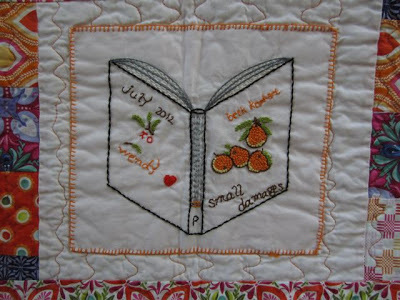
Twelve books, twelve years, four genres, and seven publishing houses ago, there was a lovely small New York Times review of a book I'd written called Into the Tangle of Friendship.
Between that day and this one, I have been buoyed by readers and friends, by an agent and editors, by good-hearted bloggers and students, and of course by family in this strange but essential writing dream. I have written odd books (a river speaks in one, corporate America is transformed into a Wonderland in another), "small" books, books that might have been more than they were and books that reached more readers than I thought possible. I have kept writing because I can't help it, because it is, as I have said before, medicinal, because even when I tried to stop, I didn't know how stopping worked. What does a life look like without story making and sentence crafting, without reaching and metaphor? I don't know. I don't want to find out.
Over the past few weeks, extraordinary kindnesses have been shown toward Small Damages, a book that I had worked on for many, many years. Kindness within Philomel, that big-hearted publishing phenom that has gifted me with the talents and deep hearts of my editor Tamra Tuller (do I love her? yes, I do), Michael Green (president and (also) writer of some of the best emails ever), Jessica Shoffel (publicist extraordinary—unbelievably smart and quick and precise and there), Julia Johnson (who told me once that she has a secret third eye), Jill Santopolo (that uber-bright cutie who forged the original link), a fantastically talented design and editorial team, and an amazingly generous sales team. Kindness from interviewers like Abby Plesser and Dennis Abrams. Kindness from magazine editors like Darcy Jacobs of Family Circle and Renee Fountain of Bella and the super nice people of the LA Times. Kindness from friends and from bloggers, each of whom is so dear to me, so valued. (In case you are wondering, the spectacular quilted cover of Small Damages above was created by blogger and friend, Wendy Robards of Caribousmom.)
That should be enough, truly, but a few days ago, something else happened. The phone rang, and it was my agent, Amy Rennert. Fortunately, I was sitting down, for Amy had called to read me Jen Doll's most amazing review of Small Damages—a review that appears in this weekend's New York Times.
We yearn, as writers, to be understood. We yearn to be read with an open heart. We can't even believe our good fortune when this happens to us in the pages of the Times. When we are read and assessed by one as intelligent and thoughtful as Jen Doll.
The Times.
I have always loved the Times. Today I love Her even more than always and forever.
There are no words.
A final note: I have been typing this blog post with fumbling fingers, and I'm quite sure that I have erred somewhere up there. But my fumbling became a trembling when Jillian Cantor sent word that Publishers Weekly had named Small Damages among the best new books for the week of July 16, 2012.
I'm floored.
Period.




Published on July 13, 2012 15:11
July 12, 2012
The So-Generous BookPage Interview
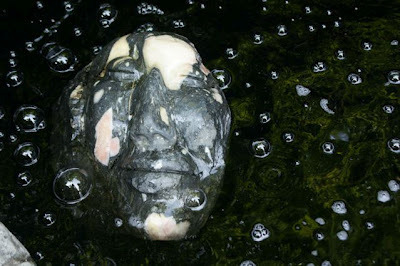
Not long ago I sat in a local coffee shop with a young woman who dazzled. Yes, that's the word. She'd found her way to the very beating heart of the publishing world as a young Vanderbilt graduate, moved from the Big Apple to the south to work as the BookPage fiction editor, and today works as a content manager for a suburban Philadelphia brand consulting firm, writing features and reviews for BookPage on the side. Beyond us, the little town of Wayne was having an outdoor festival. Between us, the talk was books and work. I adored her within seconds. She asked smart questions. She listened.
Abby Plesser (for that is this wunderkind's name) had been asked to interview me for a BookPage feature. I could not have been a luckier soul. The conversation alone would have been enough. The consequent story is more capacious, more generous than anything I could ever deserve. The piece ends with these words, below. The whole can found here.
Abby and BookPage, thank you. Jessica Shoffel, thank you (for everything).
No matter the audience, there is
one thing Kephart hopes readers
take away from her novel: not to
judge others. Of her protagonist, she
says, “Kenzie is very loving, intelligent,
moral. She is in a situation. I
think no less of her and I don’t want
my readers to think any less of her.”
Kephart speaks with such compassion
for her characters and such
passion for her work that it’s hard
not to be inspired by such an unassuming,
accomplished woman. Of
her career, she reflects, “I never want
to look back and say, ‘Well, my best
book was my first one or my fifth or
my seventh,’ so I’m highly motivated
to not just slide. I try to break form
or go to a new place in the world
or tell a story that hasn’t been told
before. I’m invested in challenging
myself and going to the verge or taking
the risk.”
Small Damages is a book well
worth the risk. Kephart has created a
lyrical, beautiful story about a young
woman at a turning point, struggling
to reconcile her choices, find
her place in the world and discover
the true meaning of family.




Published on July 12, 2012 19:17
on teaching teachers


This week, as readers of this blog know, I am at the Philadelphia Museum of Art, where K-12 teachers from all around the area have gathered for the VAST: Nature Through the Lens of Art/Science program. For two hours each afternoon I share passages from books I love, lay down challenges, talk about Rilke and Cezanne, Stanley Kunitz and Vaddey Ratner, Joan Didion and Rebecca Solnit, ghosts in gardens and rivers that flow. They write and I listen. I suggest, and they counter.
The teachers surprise me. They make me smile. They are writers, too, many of them, and certainly they are readers—men and women with opinions about what can and should trigger memory, say, or about the color blue, or about students they'll always remember. They are charming and determined and, most of all, curious and hopeful. They make me wish that I was learning in their classrooms.




Published on July 12, 2012 04:49
July 11, 2012
teaching scale and time (and Kunitz)
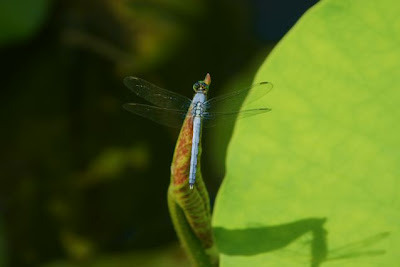
At the Philadelphia Museum of Art, where we're working on color, perception, metaphor, and the evocative shimmers of remembered gardens as part of the VAST Institute workshops, we were, on Monday, speaking of the senses writers tend to ignore. Smell and taste, perhaps because telling metaphors are elusive. Sound, because what we notice first—bird songs, insect buzz—seems somehow overly heard.
Today, while searching for illustrative examples to share by writers who are in possession of all their senses, not to mention all their wonder, I came upon this passage in Stanley Kunitz's The Wild Braid. Scale is not a sense, of course, nor is the passing of time. But they are elements of framing and reporting that writers must finally master. With the simplest possible language, Kunitz takes back in time. He isn't trying to be a poet here. He's saying, This is how it was; this is how I moved through things and saw.
During my adolescence, out in the open fields, I would sometimes pretend I was one of the insects. I became captivated by dragonflies and imagined I could see the world as they did. Everything had a different scale.
I reveled in the sensation of being so light and being able to go anywhere, unburdened by a body.
Discovering the body was part of the joy, the sense of infinite possibility of being out in the woods. I recognized that it had weight and had certain limitations—there was no denying that. Obviously one's sensitivity was less acute than that of any other living creature in the woods. At the same time, the body was the very instrument of exploration.
I would find a leaf or a stone in the underbrush and have the sensation that nobody else had seen quite the same thing. And if I came across an arrowhead, that was a real triumph.
Sometimes, especially when one gets older, one gets very clumsy in the handling of delicate objects. The hands, the fingers, are less nimble than they were. But then, there's the compensation that one knows a bit more. There's a quid pro quo.
In the woods, one loses the sense of time. It's quite a different experience from walking in the streets. The streets are human creations. In the woods what one finds are cosmic creations.




Published on July 11, 2012 06:39
July 10, 2012
be patient; it will come

For many days now, the skies have extended an apparent promise. The clouds blow in, they hover. Yellow slashes the far horizon. There is thunder. I stand at the window and wait, urging the weather on, but the weather has a mind of its own, and the darkness dissipates, and it is heat again outside, charred grass, trees losing their leaves, the glads rail thin on their dessicated stalks.
This morning I lay on the couch just after five, reading the final pages of a very long book for review. Night darkness yielded to weather darkness. There was a catch in the sky's throat. A breeze riffled the skirt of the deck umbrella. And then: rain. I held my breath, didn't stir.
It was nearly silent. It was brief. The growing things bowed.
Sometimes it is best not to stand up tall at the window, asking for things, imploring.
Sometimes we have to believe: it will come.




Published on July 10, 2012 05:17
July 9, 2012
Jen Ryland, YA Romantics, and Small Damages
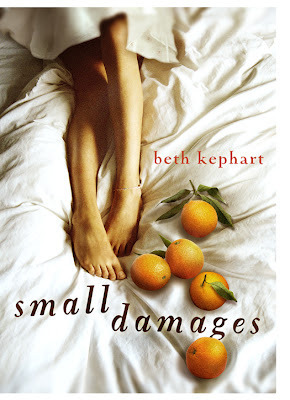
It doesn't matter how many books you've written or reviews you've read; breath holding is a writerly prerequisite. You wait. You worry. You otherwise distract yourself. And then your sweet Philomel publicist, Jess, sends you a link to something that she thinks you would perhaps like to see.
Goodness. It was nice to see this—a review from the hugely popular Jen Ryland of YA Romantics, who received an early copy of Small Damages in an ARC trade and blessed me with the generosity of her good opinion.
It's a wonderful review. I'm very lucky. I love that Jen loves my cranky Estela (I worked with her for a decade or more until I got her just right). I love, in particular, Jen's final words. The whole review is here. I tease you with its close:
Sometimes I think reading so much makes me jaded. I open new books
thinking: "yeah, book, how are you going to impress me?" This book
didn't employ a single gimmick -- no razzle-dazzle premise or
jaw-dropping plot twists or other trendy literary pyrotechnics. It just told a story, movingly and beautifully. I highly recommend it!




Published on July 09, 2012 14:30
working outside the echo chamber

Every effort must be yours and yours alone. It must be what no one but you can do, what no one but you would do. Of course it is frightening. Of course borrowing seems easier—a surer route to a map-pinned destination, a fashion already vetted, a proven diagnosis and cure.
But in the end you must get on with the business of being your own true self.
It's the hardest thing art will ever ask of you.




Published on July 09, 2012 05:40



